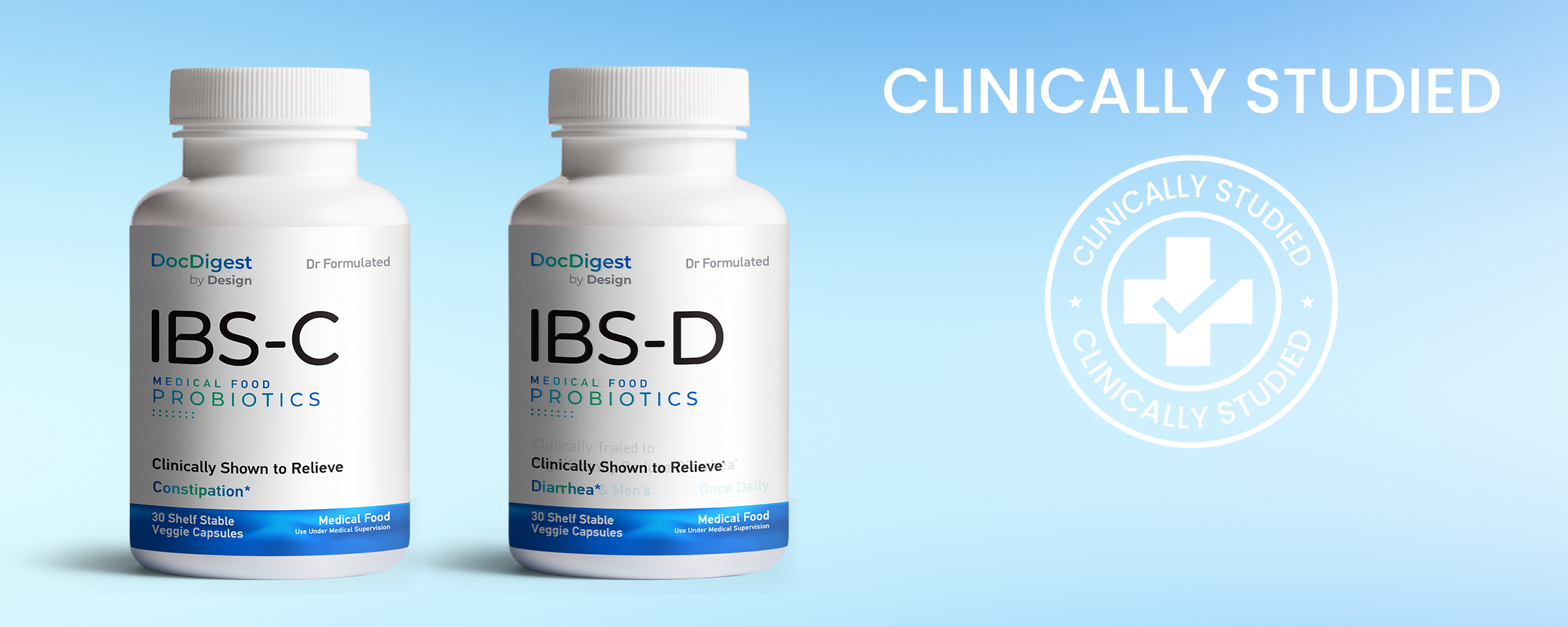
DocDigest by Design® Probiotic products have been put through clinical trials with validated results. Review and trust the science. Below are summaries of our clinical trials:
Why Clinically Proven Probiotics Are Better
IBS-C
Study Abstract: Specific probiotic strains can alleviate the gastrointestinal (GI) symptoms and psychiatric comorbidities of irritable bowel syndrome (IBS). In this randomized, double-blind, placebo-controlled study, the efficacy of Lactobacillus paracasei HA-196 (L. paracasei) and Bifidobacterium longum R0175 (B. longum) in reducing the GI and psychological symptoms of IBS was evaluated in 251 adults with constipation (IBS-C). Following a 2-week run-in period, participants were randomized to one of three interventions: L. paracasei (n = 84), B. longum (n = 83) or placebo (n = 81). IBS symptoms, stool frequency and consistency and quality of life were assessed by questionnaires. The differences from baseline in the severity of IBS symptoms at 4 and 8 weeks were similar between groups. Participants in this study were classified, after randomization, into subtypes according to Rome III. Within the L. paracasei group, complete spontaneous and spontaneous bowel movement frequency increased in participants with IBS-C (n = 10) after 8 weeks of supplementation (both p < 0.05). Both L. paracasei and B. longum supplementation improved the quality of life in emotional well-being and social functioning compared with baseline (all p < 0.05). In conclusion, L. paracasei and B. longum may reduce GI symptom severity and improve the psychological well-being of individuals with certain IBS subtypes.
IBS-D
Study Abstract: Specific probiotic strains can alleviate the gastrointestinal (GI) symptoms and psychiatric comorbidities of irritable bowel syndrome (IBS). In this randomized, double-blind, placebo-controlled study, the efficacy of Lactobacillus paracasei HA-196 (L. paracasei) and Bifidobacterium longum R0175 (B. longum) in reducing the GI and psychological symptoms of IBS was evaluated in 251 adults with diarrhea (IBS-D). Following a 2-week run-in period, participants were randomized to one of three interventions: L. paracasei (n = 84), B. longum (n = 83) or placebo (n = 81). IBS symptoms, stool frequency and consistency and quality of life were assessed by questionnaires. The differences from baseline in the severity of IBS symptoms at 4 and 8 weeks were similar between groups. Participants in this study were classified, after randomization, into subtypes according to Rome III. Within the L. paracasei group, complete spontaneous and spontaneous bowel movement frequency decreased in participants with IBS-D (n = 10, p = 0.013). Both L. paracasei and B. longum supplementation improved the quality of life in emotional well-being and social functioning compared with baseline (all p < 0.05). In conclusion, L. paracasei and B. longum may reduce GI symptom severity and improve the psychological well-being of individuals with certain IBS subtypes.

Citations
Lewis, E. D., Antony, J. M., Crowley, D. C., Piano, A., Bhardwaj, R., Tompkins, T. A., & Evans, M. (2020). Efficacy of Lactobacillus paracasei HA-196 and Bifidobacterium longum R0175 in Alleviating Symptoms of Irritable Bowel Syndrome (IBS): A Randomized, Placebo-Controlled Study. Nutrients, 12(4), 1159.
PDF article / Website: https://doi.org/10.3390/nu12041159

